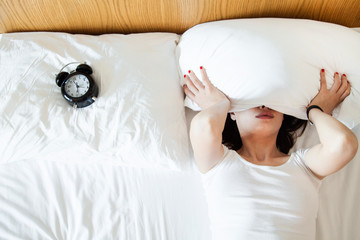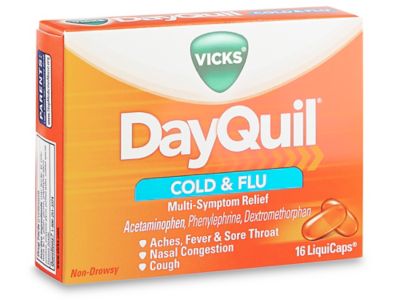Several popular prescriptions might make it difficult to fall or stay asleep, while others can make you drowsy or tired throughout the day.
Chemicals impact everyone differently, so a specific medicine may not affect you and your closest friend in the same way, although some pharmaceuticals may cause sleep disorders in the majority of individuals.
That is why today Healthsoothe is focusing on a drug known as DayQuil.
[ninja_tables id="70675"]
When most individuals want to take DayQuil, one of their main concerns is the possibility of DayQuil stimulants causing them to stay awake.
As a consequence, one of the most often asked questions before purchasing DayQuil is, "Does DayQuil keep you awake?"
“Does DayQuil keep you awake?” That is the question that Healthsoothe aims to answer today for you. So if you are among those that have always wanted to know the answer to this question, then you are in the right place.
Or have DayQuil been prescribed for you due to a particular ailment you are suffering from, and you are wondering about the side effects of this drug, or you have asked around or done a little research on DayQuil and people say that it causes sleep, and you wanna confirm this?
Then Healthsoothe has got you covered as usual. We will give you enough satisfactory answers to the question; Does DayQuil keep you awake? And we will also provide additional details you need to know about DayQuil.
Read on.
Firstly, let’s discuss on DayQuil
DayQuil is a flu and cold medication that is intended to treat symptoms including nasal congestion, sore throat, headache, fever, moderate pains, and cough. It is available without a doctor's prescription and may be acquired without a prescription (OTC).
DayQuil is available in liquid-filled capsules (LiquiCaps) or syrup form.
DayQuil is made up of three active ingredients: acetaminophen (pain reliever), Dextromethorphan (cough suppressant), and phenylephrine (nasal decongestant).
Acetaminophen (pain reliever)
Acetaminophen, often known as Paracetamol, is an analgesic and antipyretic medication.
In other words, acetaminophen lowers pain by acting as an analgesic and decreases the temperature by acting as an antipyretic.
Dextromethorphan (cough suppressant)
Dextromethorphan belongs to the antitussive drug class. It works by crossing the blood-brain barrier and activating the sigma opioid receptors on the cough center in the central nervous system to ease coughing.
This mode of action lowers the cough reflex, decreasing the need to cough and so providing comfort.
Phenylephrine (nasal decongestant)
It causes vasoconstriction by activating the alpha-1 adrenoceptors in the arterioles of the nasal mucosa.
In turn, vasoconstriction of the arterioles of the nasal mucosa reduces nasal edema and increases sinus cavity drainage.
Uses of DayQuil
DayQuil is a medication used to treat cold and flu symptoms. It is also used to treat a cough, sore throat, stuffy nose, body pains, headache, and/or fever.
Medical illnesses such as the common cold, seasonal flu, sinusitis, bronchitis, or other respiratory ailments are often responsible for these symptoms.
Side effects of DayQuil
Although DayQuil is generally safe when taken as instructed, it may cause certain mild and major side effects.
The majority of DayQuil side effects are self-resolving and do not need medical treatment.
If you have a significant negative effect or any mild side effect for an extended length of time, contact your health care practitioner.
Minor Side effects
DayQuil's more frequent and milder side effects include an upset stomach, nausea, vomiting, difficulty sleeping, dizziness, lightheadedness, anxiousness/ anxiety, and sleepiness.
Serious side effects
An allergic response is a significant side effect of DayQuil that needs immediate medical treatment.
An allergic medication response may cause a variety of symptoms, including trouble breathing, dyspnea, difficulty swallowing, skin rash, hives, red, peeling, and blistering skin, acute itching, swelling of the tongue, lips, and neck, and edema of the hands, legs, and feet.
It is critical to seek immediate medical attention if you experience any of the above-mentioned symptoms while taking DayQuil.
DayQuil Interactions
DayQuil's active components, acetaminophen, dextromethorphan, and phenylephrine, may interact with other drugs or foods.
As a result, patients should exercise care while using DayQuil since these drug-drug interactions or drug-food interactions are often additive or synergistic, which means that they may cause greater damage when taken together than when taken separately.
If you are currently using drugs like carbamazepine, isoniazid, phenobarbital, phenytoin, phenothiazines, or warfarin, please be aware that the acetaminophen in DayQuil may interact with these medications and produce adverse effects.
If you are currently using monoamine oxidase inhibitors (MAOIs) such as isocarboxazid, phenelzine, selegiline, or tranylcypromine, you should exercise caution since the phenylephrine and dextromethorphan in DayQuil have been shown to interact negatively with MAOIs.
Please keep in mind that even if you have stopped taking the medications indicated above, potential interactions are still possible until they are eliminated from your system.
As a result, please be cautious and always contact your doctor ahead of time.
When using DayQuil, avoid drinking alcohol.
It has been claimed that combining DayQuil and alcohol may result in significant liver damage.
It is therefore advised to avoid taking DayQuil if you consume three or more alcoholic beverages per day.
You should also avoid using DayQuil with any other acetaminophen-containing drugs since acetaminophen overdose may result in poisoning and serious liver damage.
Avoid drinking grapefruit juice while taking this medicine. Grapefruit juice may increase the level of dextromethorphan, which is one of the constituents in DayQuil. At greater dosages, side symptoms such as anxiety and dizziness are more common.
What will happen if I miss significant doses of DayQuil and what do I do?
Nothing much will happen. Just that if you have missed significant doses of the drug, it will not be effective or potent enough to treat you for the ailment you took it for.
Do the following if you have missed dose on significant doses;
- If you forget to take one or more doses: take your next dose at the usual time and in the average amount. Do not take any more than your doctor prescribed.
- If you miss one dose, skip it and continue with your normal schedule.
- Do not increase the dosage to catch up with the missed doses.
- You should consult your doctor on what to do if you don’t know what to do.
What will happen if I overdose on DayQuil and what do I do?
Research has shown that people who complained that DayQuil has major side effects like difficulty breathing, breathlessness, difficulty swallowing, skin rash, hives, red, peeling and blistering skin, intense itchiness, swelling of the tongue, lips, and throat, and edema of hands, legs, and feet had overdosed on it.
Consult your doctor immediately if you have symptoms that won’t go away and also stop taking the medication.
Why do people think that DayQuil keep you awake?
Before I go any further, there is something I need to clear. Many individuals are confused about the difference between DayQuil and NyQuil.
Because they are both used to treat cold and flu symptoms, many people believe that these two medicines operate identically in every way.
However, there is an underlying yet significant difference between these two therapies.
Okay, so DayQuil fulfills its function of curing the disease it was prescribed for, but it does not produce sleep, but NyQuil does its duty while simultaneously inducing sleep.
Many people believe that since NyQuil causes sleep, DayQuil will do the same, however, this is a significant myth, which I hope I have dispelled.
NyQuil is an over-the-counter sleeping aid that is used to treat cold and flu symptoms. NyQuil includes doxylamine, an antihistamine medication that may produce sleepiness in many individuals.
However, NyQuil should not be used as a sleep aid since it includes Dextromethorphan, which may produce hallucinations in excessive dosages.
DayQuil, on the other hand, does not include any stimulants that may disrupt your sleep, nor does it contain any drowsy substances that could make you sleepy.
As a result, DayQuil has no components that may interfere with your sleep and is safe to take throughout the day while completing ordinary tasks.
Please keep in mind that DayQuil does not 'kill' the virus that causes colds. However, it may assist with the symptoms. There is presently no medicine available to treat viral infections. When it comes to colds, the same holds.
Colds are self-limiting and will resolve on their own. However, you do not need to experience the symptoms. It might be advantageous to take DayQuil/NyQuil.
Continue reading to find out if DayQuil will keep you awake.
Tips for sleeping after taking DayQuil
As previously said, getting adequate sleep is critical, particularly while unwell. This will aid in the recuperation of your body.
We recognize, however, that sleeping may be difficult when you have a cold or the flu. So, what are the appropriate methods to sleep well under these conditions?
Gargle with a water-salt solution
Your parents and grandparents are most likely still doing it. It's hardly unexpected, considering that this procedure works and has been used for ages as a cure.
To begin, just prepare lukewarm saline water. It may seem difficult, but all it needs is one cup of water and a quarter teaspoon of table salt.
The solution should then be gargled for immediate relief. This should aid in the prevention of bacterial growth. To relieve a sore throat, gargle with lukewarm saline water shortly before going to bed.
Gargling may provide immediate comfort and is a simple home cure for soothing a sore throat. Gargling may also help to prevent the spread of bacterial illnesses like strep throat.
Gargling is a low-cost, natural, and risk-free way to treat flu symptoms.
Use Steam before bedtime
Inhale steam before going to bed to help expand your airways. Steaming is also useful for those who have colds or the flu. This could assist to clean out your upper respiratory tract and minimize nasal congestion.
This may also be beneficial if you have a sore throat. Some individuals add eucalyptus oil to their water to make it more effective. Steam may also relieve pain and soothe a sore throat.
You may also try adding a few drops of eucalyptus oil to your steaming water since it has various health benefits ranging from anti-inflammatory characteristics to promoting sleep.
Always exercise caution while inhaling steam since a sudden inhalation may be painful; start with lesser inhales to check that you're comfortable with the steam and let the water cool somewhat if you aren't.
Invest in a vaporizer or good humidifier
If you have a humidifier or vaporizer, this is a good thing. This should be used since it helps to enhance the humidity in the air. As a consequence, breathing becomes simpler for you, particularly if you have a cold, flu, or a stuffy nose.
You must, however, ensure that your product is acceptable for the size of your space. You must thoroughly inspect the label. Also, remember to clean it to remove dirt and germs.
Clear your nose using Nasal Strips
Nasal strips may be put over the bridge of your nose to temporarily enlarge your nasal channel and provide more airflow for improved breathing while you sleep.
Raise your head to drain your sinuses
While sleeping, you might try elevating your head with a few cushions. By generating a natural slope to clear your sinuses, this sleeping position will help you breathe better while you sleep.
The mucus and fluid buildup in your upper respiratory tube will gradually clear up, allowing you to fall asleep more easily. You may do this by piling a few pillows behind your head or, if feasible, elevating the height of your bed.
However, stacking too many pillows may cause pressure on your neck, resulting in neck pain, muscular tension, and discomfort.
Ideally, two normal pillows should be enough to remove the mucus from your sinuses. An adjustable bed provides a safer option to raise your head while keeping proper posture.
Although it may seem that purchasing an adjustable bed for a cold is a waste of money, these beds may be a fantastic investment if you have ailments such as acid reflux, COPD, GERD, back discomfort, or you snore a lot since elevating your upper body might ease the symptoms.
Does DayQuil keep you awake? – The truth from Healthsoothe

Because DayQuil does not include Doxylamine, it is unlikely that you would feel drowsy after taking the prescribed amount.
Even though DayQuil is a non-drowsy formulation, some people seem to have experienced minor lightheadedness after taking it.
However, these are most likely subjective DayQuil symptoms since each patient reacts differently to each medicine, and not every patient experiences lightheadedness.
Furthermore, research has revealed that persons who complained about DayQuil causing sleep had overdosed on it or used the medicine with other prescriptions they weren't supposed to take, particularly sleep medications.
Another reason that makes DayQuil keep you awake is if you combine it with medications that interact poorly with DayQuil, such as alcohol.
And if you have specific problems, DayQuil is not suggested for you or should only be administered to you under medical supervision and only if the advantages exceed the unwanted effects.
Despite this, some people may continue to take DayQuil without visiting their doctor, making them vulnerable to the negative effects that occur when you overuse DayQuil, such as sleepiness.
Always see your doctor, physician, or healthcare provider to determine if a particular drug is appropriate for you to prevent dangerous side effects.
More tips from Healthsoothe concerning DayQuil
It is crucial to remember that DayQuil should not be given to children under the age of six unless their physician has recommended it.
It is critical to avoid abuse or misuse of the DayQuil component, Dextromethorphan.
Dextromethorphan is a widely abused medication because large dosages may produce hallucinations.
As a result, it is essential to closely stick to the DayQuil safe dose and prevent the potentially harmful abuse of DayQuil or its contents.
Avoid using DayQuil with other sleep aids. There isn't enough information to say how DayQuil could interact with sleep drugs.
However, it is strongly advised that you avoid taking any sleep-producing drugs while using DayQuil since there may be certain undocumented but hazardous drug interactions that may have poor health implications such as inducing sleep and sleepiness.
Before using any kind of sleeping drug in combination with DayQuil, you must obtain expert counsel from your health care practitioner.
Please also keep in mind that alcohol should never be used to induce sleep.
Non-medicinal sleep aids may be tried. If you have trouble falling asleep while recuperating from a cold or flu, you may take these non-medicated sleeping aids with DayQuil to prevent any unneeded interruption.
You may, for example, attempt to create a peaceful resting environment, utilize aromatherapy, listen to soothing music, and use a humidifier.
You may also attempt to correctly arrange your sleep time, avoid drinking coffee before bed, and eat a light meal to help you fall asleep faster and sleep well.
DayQuil will not put you to sleep, but Nyquil will.
I already defined the distinction between DayQuil and NyQuil.
In conclusion, DayQuil is a non-drowsy multi-symptom relief medicine that will not keep you awake if taken before bed and should not be used to attempt to remain awake since it lacks the active mimicking elements needed to promote alertness.
DayQuil does not affect sleep patterns or quality.
NyQuil, on the other hand, includes doxylamine, an antihistamine that might make you drowsy, but it should not be used just as a sleep aid since greater dosages can produce hallucinations.
DayQuil is a useful and safe medication; nevertheless, it may interact negatively with alcohol, MAOIs, and other medicines.
DayQuil, like other medications, may cause mild side effects such as nausea, vomiting, anxiety, and stomach discomfort, as well as significant adverse effects needing emergency medical treatment, such as an anaphylactic response.
It is uncertain if DayQuil interacts with sleep drugs, although it is generally safe to use with non-medicated sleeping aids.
The bottom line on DayQuil by Healthsoothe
Finally, keep in mind that DayQuil is a non-drowsy medication, not a stimulating or invigorating one. This means you can take it wherever you want while still getting a decent night's sleep.
There are several sleep aids that you may take in conjunction with DayQuil to enhance the quality of your sleep. Some individuals feel that improved eating habits contribute to better sleep.
Other good sleep hygiene activities are as beneficial. Furthermore, you have several safe options for increasing your energy levels healthily.
We hope you find the information in this article beneficial as you begin taking DayQuil to feel better.









